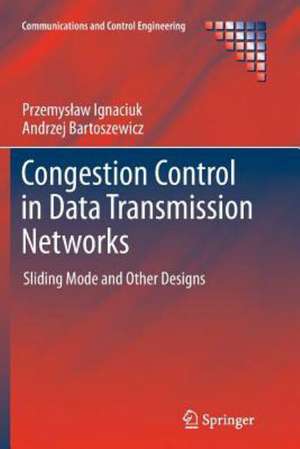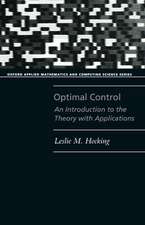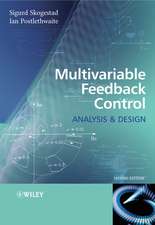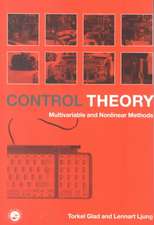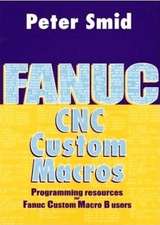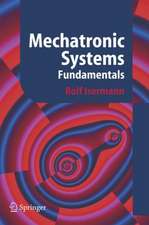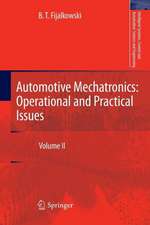Congestion Control in Data Transmission Networks: Sliding Mode and Other Designs: Communications and Control Engineering
Autor Przemysław Ignaciuk, Andrzej Bartoszewiczen Limba Engleză Paperback – 19 sep 2014
The authors address a number of difficult real-life problems, such as:
optimal control of flows with disparate, time-varying delay;
the existence of source and channel nonlinearities;
the balancing of quality of service and fairness requirements; and
the incorporation of variable rate allocation policies.
Appropriate control mechanisms which can handle congestion and guarantee high throughput in various traffic scenarios (with different networking phenomena being considered) are proposed. Systematic design procedures using sound control-theoretic foundations are adopted. Since robustness issues are of major concern in providing efficient data-flow regulation in today’s networks, sliding-mode control is selected as the principal technique to be applied in creating the control solutions. The controller derivation is given extensive analytical treatment and is supported with numerous realistic simulations. A comparison with existing solutions is also provided. The concepts applied are discussed in a number of illustrative examples, and supported by many figures, tables, and graphs walking the reader through the ideas and introducing their relevance in real networks.
Academic researchers and graduate students working in computer networks and telecommunications and in control (especially time-delay systems and discrete-time optimal and sliding-mode control) will find this text a valuable assistance in ensuring smooth data-flow within communications networks.
| Toate formatele și edițiile | Preț | Express |
|---|---|---|
| Paperback (1) | 645.47 lei 43-57 zile | |
| SPRINGER LONDON – 19 sep 2014 | 645.47 lei 43-57 zile | |
| Hardback (1) | 651.51 lei 43-57 zile | |
| SPRINGER LONDON – aug 2012 | 651.51 lei 43-57 zile |
Din seria Communications and Control Engineering
- 18%
 Preț: 953.65 lei
Preț: 953.65 lei - 18%
 Preț: 953.65 lei
Preț: 953.65 lei - 18%
 Preț: 1128.08 lei
Preț: 1128.08 lei - 20%
 Preț: 879.71 lei
Preț: 879.71 lei - 18%
 Preț: 1117.03 lei
Preț: 1117.03 lei - 15%
 Preț: 659.70 lei
Preț: 659.70 lei - 15%
 Preț: 656.89 lei
Preț: 656.89 lei - 18%
 Preț: 896.52 lei
Preț: 896.52 lei - 18%
 Preț: 1113.26 lei
Preț: 1113.26 lei - 18%
 Preț: 1388.22 lei
Preț: 1388.22 lei - 15%
 Preț: 647.27 lei
Preț: 647.27 lei - 18%
 Preț: 954.45 lei
Preț: 954.45 lei - 18%
 Preț: 1231.47 lei
Preț: 1231.47 lei - 18%
 Preț: 948.92 lei
Preț: 948.92 lei - 18%
 Preț: 1232.57 lei
Preț: 1232.57 lei - 15%
 Preț: 643.34 lei
Preț: 643.34 lei - 18%
 Preț: 1127.28 lei
Preț: 1127.28 lei - 18%
 Preț: 1401.30 lei
Preț: 1401.30 lei - 15%
 Preț: 651.51 lei
Preț: 651.51 lei - 20%
 Preț: 1454.07 lei
Preț: 1454.07 lei - 18%
 Preț: 948.79 lei
Preț: 948.79 lei - 18%
 Preț: 1233.06 lei
Preț: 1233.06 lei - 18%
 Preț: 947.85 lei
Preț: 947.85 lei - 18%
 Preț: 950.96 lei
Preț: 950.96 lei - 18%
 Preț: 956.99 lei
Preț: 956.99 lei - 15%
 Preț: 644.18 lei
Preț: 644.18 lei - 18%
 Preț: 946.87 lei
Preț: 946.87 lei - 18%
 Preț: 951.14 lei
Preț: 951.14 lei - 18%
 Preț: 961.55 lei
Preț: 961.55 lei - 15%
 Preț: 644.18 lei
Preț: 644.18 lei - 20%
 Preț: 990.80 lei
Preț: 990.80 lei - 18%
 Preț: 1006.72 lei
Preț: 1006.72 lei - 18%
 Preț: 942.44 lei
Preț: 942.44 lei - 18%
 Preț: 1233.06 lei
Preț: 1233.06 lei - 15%
 Preț: 641.85 lei
Preț: 641.85 lei - 18%
 Preț: 957.75 lei
Preț: 957.75 lei - 15%
 Preț: 649.87 lei
Preț: 649.87 lei - 18%
 Preț: 958.07 lei
Preț: 958.07 lei - 18%
 Preț: 1117.99 lei
Preț: 1117.99 lei - 18%
 Preț: 1395.94 lei
Preț: 1395.94 lei - 18%
 Preț: 781.62 lei
Preț: 781.62 lei - 18%
 Preț: 953.20 lei
Preț: 953.20 lei - 18%
 Preț: 1109.78 lei
Preț: 1109.78 lei - 18%
 Preț: 947.35 lei
Preț: 947.35 lei
Preț: 645.47 lei
Preț vechi: 759.37 lei
-15% Nou
Puncte Express: 968
Preț estimativ în valută:
123.51€ • 129.28$ • 102.80£
123.51€ • 129.28$ • 102.80£
Carte tipărită la comandă
Livrare economică 31 martie-14 aprilie
Preluare comenzi: 021 569.72.76
Specificații
ISBN-13: 9781447158318
ISBN-10: 1447158318
Pagini: 400
Ilustrații: XVI, 384 p.
Dimensiuni: 155 x 235 x 21 mm
Greutate: 0.56 kg
Ediția:2013
Editura: SPRINGER LONDON
Colecția Springer
Seria Communications and Control Engineering
Locul publicării:London, United Kingdom
ISBN-10: 1447158318
Pagini: 400
Ilustrații: XVI, 384 p.
Dimensiuni: 155 x 235 x 21 mm
Greutate: 0.56 kg
Ediția:2013
Editura: SPRINGER LONDON
Colecția Springer
Seria Communications and Control Engineering
Locul publicării:London, United Kingdom
Public țintă
ResearchCuprins
Introduction.- Congestion Control in Data Transmission Networks: An Historical Perspective.- Fundamentals of Sliding-mode Controller Design.- Flow Control in Continuous-time Systems.- Flow Control in a Single-source Discrete-time System.- Flow Control in a Multi-source Discrete-time System.- Flow Control in Sampled-data Systems.- Discrete Sliding-mode Congestion Control in TCP Networks. Summary and Conclusions. Appendices: Simulations Performed with NS2 Network Simulator; Control-theoretic Concepts.
Notă biografică
Przemysław Ignaciuk received the MSc degree in telecommunications and computer science, and the PhD degree in control engineering and robotics with applications to modeling and control of communication networks from the Technical University of Łódź, Poland. He worked for a few years at a full-time position as analyst and system designer in the telecommunications industry. He participated in several commercial and academic international projects in Japan, Sweden, France, and Poland. His principal areas of expertise and research interests include congestion control, time-delay systems, robust control, dynamical optimization, and software architectural design. He has published over 60 journal and conference papers, mainly in the field of data transmission networks and optimization of logistic processes.
Andrzej Bartoszewicz received the MSc degree in 1987 and the PhD degree in 1993 both from Technical University of Łódź, Poland. Then he obtained the degree of doktor habilitowany in control engineering and robotics from the Academy of Mining and Metallurgy in Cracow, Poland. He was visiting scholar at Purdue University, West Lafayette, Indiana, USA and at Strathclyde University, Glasgow, UK. Then for one year he was at the University of Leicester, UK. Currently he is Professor at the Technical University of Łódź, Vice-dean of Faculty of Electrical, Electronic, Computer and Control Engineering, head of the Electric Drive and Industrial Automation Group and Vice-director of the Institute of Automatic Control. He has published three monographs (having served as an editor of three others) and over 230 papers, primarily in the fields of sliding-mode control and congestion control in data transmission networks.
Andrzej Bartoszewicz received the MSc degree in 1987 and the PhD degree in 1993 both from Technical University of Łódź, Poland. Then he obtained the degree of doktor habilitowany in control engineering and robotics from the Academy of Mining and Metallurgy in Cracow, Poland. He was visiting scholar at Purdue University, West Lafayette, Indiana, USA and at Strathclyde University, Glasgow, UK. Then for one year he was at the University of Leicester, UK. Currently he is Professor at the Technical University of Łódź, Vice-dean of Faculty of Electrical, Electronic, Computer and Control Engineering, head of the Electric Drive and Industrial Automation Group and Vice-director of the Institute of Automatic Control. He has published three monographs (having served as an editor of three others) and over 230 papers, primarily in the fields of sliding-mode control and congestion control in data transmission networks.
Textul de pe ultima copertă
Congestion Control in Data Transmission Networks details the modeling and control of data traffic in communication networks. It shows how various networking phenomena can be represented in a consistent mathematical framework suitable for rigorous formal analysis. The monograph differentiates between fluid-flow continuous-time traffic models, discrete-time processes with constant sampling rates, and sampled-data systems with variable discretization periods.
The authors address a number of difficult real-life problems, such as:
• optimal control of flows with disparate, time-varying delay;
• the existence of source and channel nonlinearities;
• the balancing of quality of service and fairness requirements; and
• the incorporation of variable rate allocation policies.
Appropriate control mechanisms which can handle congestion and guarantee high throughput in various traffic scenarios (with different networking phenomena being considered) are proposed. Systematic design procedures using sound control-theoretic foundations are adopted. Since robustness issues are of major concern in providing efficient data-flow regulation in today’s networks, sliding-mode control is selected as the principal technique to be applied in creating the control solutions. The controller derivation is given extensive analytical treatment and is supported with numerous realistic simulations. A comparison with existing solutions is also provided. The concepts applied are discussed in a number of illustrative examples, and supported by many figures, tables, and graphs walking the reader through the ideas and introducing their relevance in real networks.
The authors address a number of difficult real-life problems, such as:
• optimal control of flows with disparate, time-varying delay;
• the existence of source and channel nonlinearities;
• the balancing of quality of service and fairness requirements; and
• the incorporation of variable rate allocation policies.
Appropriate control mechanisms which can handle congestion and guarantee high throughput in various traffic scenarios (with different networking phenomena being considered) are proposed. Systematic design procedures using sound control-theoretic foundations are adopted. Since robustness issues are of major concern in providing efficient data-flow regulation in today’s networks, sliding-mode control is selected as the principal technique to be applied in creating the control solutions. The controller derivation is given extensive analytical treatment and is supported with numerous realistic simulations. A comparison with existing solutions is also provided. The concepts applied are discussed in a number of illustrative examples, and supported by many figures, tables, and graphs walking the reader through the ideas and introducing their relevance in real networks.
Caracteristici
Broad literature overview give the reader a solid background on the evolution of congestion control techniques in the history of modern networking Numerous examples facilitate understanding of the key aspects of data flow regulation in communication networks Thorough discussion of unique modeling solutions enable the designer to apply advanced techniques of control theory to network analysis and protocol upgrade A separate chapter is provided to familiarize the reader with the design methods and characteristics of sliding-mode control
